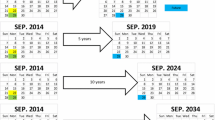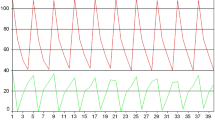Abstract
It is common for researchers studying infinite horizon dynamic games in a lab experiment to pay participants in a variety of ways, including but not limited to outcomes in all rounds or for a randomly chosen round. We argue that these payment schemes typically induce different preferences over outcomes than those of the target game, which in turn would typically implement different outcomes for a large class of solution concepts (e.g., subgame perfect equilibria, Markov equilibria, renegotiation-proof equilibria, rationalizability, and non-equilibrium behavior). For instance, paying subjects for all rounds generates strong incentives to behave differently in early periods as these returns are locked in. Relatedly, a compensation scheme that pays subjects for a randomly chosen round induces a time-dependent discounting function. Future periods are discounted more heavily than the discount rate in a way that can change the theoretical predictions both quantitatively and qualitatively. We rigorously characterize the mechanics of the problems induced by these payment methods, developing measures to describe the extent and shape of the distortions. Finally, we prove a uniqueness result: paying participants for the last (randomly occurring) round, is the unique scheme that robustly implements the predicted outcomes for any infinite horizon dynamic game with time separable utility, exponential discounting, and a payoff-invariant solution concept.
Similar content being viewed by others
References
Azrieli, Y., Chambers, C.P., Healy, P.J.: Eliciting multiple choices: A theoretical analysis of incentives in experiments. Technical report, Working Paper, Ohio State University (2012)
Azrieli, Y., Chambers, C.P., Healy, P.J.: Incentives in experiments: a theoretical analysis. J. Polit. Econ. 126(4), 1472–1503 (2018)
Brown, A.L., Chua, Z.E., Camerer, C.F.: Learning and visceral temptation in dynamic saving experiments. Q. J. Econ. 124(1), 197–231 (2009)
Cabral, L., Ozbay, E.Y., Schotter, A.: Intrinsic and instrumental reciprocity: An experimental study. Technical report, Technical report, Working paper. New York University (2011)
Chandrasekhar, A.G., Kinnan, C., Larreguy, H.: Informal insurance, social ties, and financial development: Evidence from a lab experiment in the field. In: MIT Working Paper (2011)
Charness, G., Genicot, G.: Informal risk sharing in an infinite-horizon experiment*. Econ. J. 119(537), 796–825 (2009)
Cooper, R., DeJong, D.V., Forsythe, R., Ross, T.W.: Forward induction in the battle-of-the-sexes games. Am. Econ. Rev. 5, 1303–1316 (1993)
Dal Bo, P.: Cooperation under the shadow of the future: experimental evidence from infinitely repeated games. Am. Econ. Rev. 95(5), 1591–1604 (2005)
Davis, D.D., Holt, C.A.: Experimental Economics. Princeton University Press, Princeton (1993)
Fischer, G.: Contract structure, risk-sharing, and investment choice. Econometrica 81(3), 883–939 (2013)
Fréchette, G.R., Yuksel, S.: Infinitely repeated games in the laboratory (2013)
Gneezy, U., Rustichini, A.: Pay enough or don’t pay at all. Q. J. Econ. 115(3), 791–810 (2000)
Harrison, G.W., Rutström, E.E.: Risk aversion in the laboratory. Res. Exp. Econ. 12, 41–196 (2008)
Harrison, G.W., List, J.A., Towe, C.: Naturally occurring preferences and exogenous laboratory experiments: a case study of risk aversion. Econometrica 75(2), 433–458 (2007)
Holt, C.A., Laury, S.K.: Risk aversion and incentive effects. Am. Econ. Rev. 92(5), 1644–1655 (2002)
Lei, V., Noussair, C.N.: An experimental test of an optimal growth model. Am. Econ. Rev. 5, 549–570 (2002)
Murnighan, J.K., Roth, A.E.: Expecting continued play in prisoner’s dilemma games a test of several models. J. Confl. Resolut. 27(2), 279–300 (1983)
Roth, A.E., Murnighan, J.K.: Equilibrium behavior and repeated play of the prisoner’s dilemma. J. Math. Psychol. 17(2), 189–198 (1978)
Sherstyuk, K., Tarui, N., Saijo, T.: Payment schemes in infinite-horizon experimental games. Exp. Econ. 16(1), 125–153 (2013)
Vespa, E.: Cooperation in dynamic games: an experimental investigation. Available at SSRN 1961450 (2013)
Author information
Authors and Affiliations
Corresponding authors
Additional information
Publisher's Note
Springer Nature remains neutral with regard to jurisdictional claims in published maps and institutional affiliations.
Rights and permissions
About this article
Cite this article
Chandrasekhar, A.G., Xandri, J.P. A note on payments in the lab for infinite horizon dynamic games with discounting. Econ Theory 75, 389–426 (2023). https://doi.org/10.1007/s00199-021-01409-x
Received:
Accepted:
Published:
Issue Date:
DOI: https://doi.org/10.1007/s00199-021-01409-x




